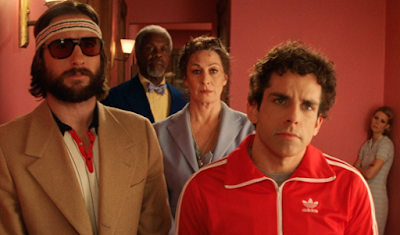Favorite Movies and Other People's Blogs
(Look! I'm famous! I'm posting on the erudite, engaging Watching Ourselves blog!)
Before I saw The Royal Tenenbaums, I’ll admit, I was unfairly pre-disposed to love it. The first truly cathartic experience I had in a movie theatre was in the late-run cheap theatre in a strip mall in Toledo, Ohio where I saw my first Wes Anderson film Rushmore (his second after Bottle Rocket). I was astonished as I saw that a filmmaker had so crystallized my adolescent self, and crafted an epic tale about an over-reaching, excessively-articulate, insecurely-arrogant, self-styled creative genius. As a 15 year old? That was precisely who I had been. (And, while adulthood had lent me many devices to mask it? I am still that guy.) So I came to The Royal Tenenbaums hoping for more of that drug, I was both hopeful and fearful that the film wouldn’t live up to my expectations.
The Royal Tenenbaums sets out to be a film about a family of geniuses, but before the first act is over, we’ve been disabused of that notion. The Tenenbaums haven’t just “fallen on hard times” as Charlie Rose suggests — they are a spectacularly wrecked lot. With the possible exception of the matriarch, Etheline, all of them seem to have either failed to live up to their childhood promise, or worse, turned their gifts into indulgence imprisoning themselves or others. The downward slide of their linked fates provides laugh after laugh after laugh for the second act of the movie, but we are not invited to laugh at them or with them, we are only invited to laugh-in-spite-of-ourselves. We laugh because their bad behavior is too terrible to believe. We laugh because they continue to rely on rituals, talismans, habits and obsessions that are, well, laughable in their inadequacy. Some of us find it too painful to laugh at characters we care about, and it doesn’t feel funny to watch someone engage in self-destructive behavior. And really this is, I think the genius of Wes Anderson in this film and in most of his other films too.
A frequent criticism of Wes suggests his films are unreasonably excessive and self-indulgent. I think that’s partly true, but not enough true. Are his characters exaggerated in their costumes, quirkiness, and idiosyncracies? Uniformly, yes. Are the sets so carefully and dramatically constructed that they look like a mockery of Movie Sets? Without question, yes. Do the direction, camera set-ups and line readings all seem markedly self-aware? Of course they do. That’s what makes a Wes Anderson film a Wes Anderson film. But I’d argue that this rigor is more of a restraint than an excess.
 The narrator’s voice, the stagey-blocking, the rare use of a close up? Anderson holds us at a distance throughout this film: BOTH giving us deep knowledge of the characters AND refusing, until deep into the film, to let us care. This is a story about Storytellers who have a hard time living up to their own Stories and it is told to us by a storyteller who, by refusing realism and mainstream movie-making conventions wants us to Think About and Care About these characters (and storytelling) in equal measure.
The narrator’s voice, the stagey-blocking, the rare use of a close up? Anderson holds us at a distance throughout this film: BOTH giving us deep knowledge of the characters AND refusing, until deep into the film, to let us care. This is a story about Storytellers who have a hard time living up to their own Stories and it is told to us by a storyteller who, by refusing realism and mainstream movie-making conventions wants us to Think About and Care About these characters (and storytelling) in equal measure.
So I loved it. Wes Anderson couldn’t have known that I grew up in a “family of geniuses”, and he couldn’t have known that my family mythology had been gradually crumbling and disintegrating ever since. But he somehow spoke to me personally, anyway. I loved this film the first time I watched it because I recognized the wreck I had come from. Ten(ish) viewings later, I love it because it describes so aptly the wreck that I am.
And I also love it because he invites us to consider how profoundly we all fail to live up to our promise, how broken families are the only kind of families, how grace only emerges in moments of ruin, and how helpful it can be to laugh at the absurdity of our own stories.
Our greatest genius? Is always incipient calamity.
Our only salvation? Is found in the words of Henry Sherman. When he arrives in the Recovery Room, confronted by betrayal, exhaustion, failure, pain and despair he says:
“How can I help?”
And self-absorbed archtypal-bad-father Royal isn’t even in the room to hear these words. Somehow though, he realizes that what little help he can offer is his only salvation, the only thing that can make him worthy of the kind of epitaph he’s always wanted. The only thing that any of us can do really? Is acknowledge the inadequacy of our genius, and offer our modest little help anyway.



Comments